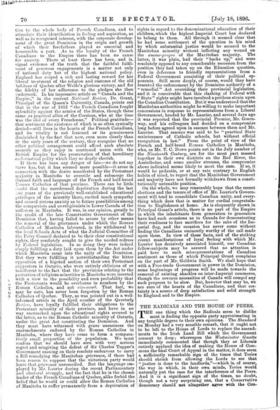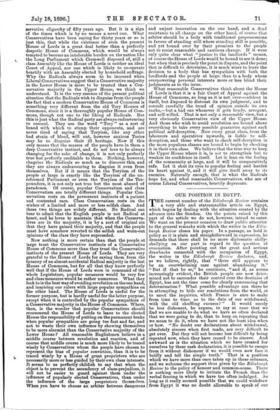THE RADICALS AND THE HOUSE OF PEERS. T HE one thing
which the Radicals seem to dislike most is finding the opposite party approximating in any tangible degree to their own opinions. The Standard on Monday had a very sensible remark, that it ought not to be left to the House of Lords to replace the amend- ments to the Irish Land Bill which the Government consent to drop ; whereupon the Westminster Gazette immediately commented that though they as Liberals entirely applaud the idea of making the House of Com- mons the final Court of Appeal in the matter, it does seem a sufficiently remarkable sign of the times that Tories should shrink from allowing the Lords to see that "justice is done to the landlords,"—which is, of course, the way in which, in their own minds, Tories would. naturally put the case for the interference of the Peers. And it is a significant sign of the times, no doubt, though not a very surprising one, that a Conservative democracy should net altogether agree with the Con- servative oligarchy of fifty years ago. But it is a sign of the times which is by no means a novel one. What Conservatives have been saying for thirty years or so is just this, that while the existence of even the present House of Lords is a great deal better than a perfectly despotic House of Commons, which would be always tempted to become an intolerable burden on the nation like the Long Parliament which Cromwell disposed of, still a class Assembly like the House of Lords is neither an ideal Court of Appeal, nor one which is likely to co-operate heartily with an Assembly elected by household suffrage. Why the Radicals always seem to be incensed when Liberal Conservatives suggest that a Conservative majority in the Lower House is more to be trusted than a Con- servative majority in the Upper House, we think we understand. It is the very essence of the present political situation that the Radicals wish to disguise from the people the fact that a modern Conservative House of Commons is something very different from the old Tory Houses of Commons, since it is a thoroughly popular House of Com- mons, though not one to the liking of Radicals. But this is just what the Radical party are always endeavouring to conceal. They use the word " Tory " as a sort of brand with which to stamp their opponents, and are never tired of saying that Toryism, like any other bad strain of blood, will out, however anxious Tories may be to disguise their ill heritage. Now if this only means that the masses of the people have in them a deep Conservative instinct, and do not love to be always changing for the sake of change, it is not only perfectly true but perfectly creditable to them. Nothing, however, chagrins the Radicals so much as to discover this, and they are always endeavouring to disguise it even from themselves. But if it means that the Toryism of the people at large is exactly like the Toryism of the un- reformed Parliament or even the Toryism of the Ten- pounders, it is not only not true but the most absurd of paradoxes. Of course, popular Conservatism and class Conservatism are totally different things. Popular Con- servatism rests on the permanent instincts of a patient and contented race. Class Conservatism rests on the wishes of a limited and more or less selfish class. And these two things are widely different. No Radical can bear to admit that the English people is not Radical at heart, and he loves to maintain that when the Conserva- tives are in the majority, it is by a sort of original sin that they have gained their majority, and that the people must have somehow reverted to the selfish and worn-out Dpinions of the class they have superseded.
Now nothing is more certain than that the people at large trust the Conservative instincts of a Conservative House of Commons more than they trust the Conservative instincts of the present House of Lords. They are very grateful to the House of Lords for saving them from the tyranny of an almost accidental Radical majority in the last House of Commons, but for all that they know perfectly well that if the House of Lords were in command of the whole Legislature, popular measures would be very few and class measures would be rather numerous. What they look to is the best way of avoiding revolution on the one hand, and inspiring our rulers with large popular sympathies on the other hand. The House of Lords is useful for the former purpose, but is hardly useful for the latter purpose, except when it is controlled by the popular sympathies of a Conservative majority in the House of Commons. Where, then, is the wonder that popular Conservatives should recommend the House of Lords to leave to the elected House the responsibility of putting on the permanent brake when popular sympathies are going too fast and far, and not to waste their own influence by showing themselves to be more alarmist than the Conservative majority of the Lower House ? All reasonable Englishmen believe in a middle course between revolution and reaction, and of course that middle course is much more likely to be traced wisely by Conservatives whom the people have chosen to represent the bias of popular conviction, than it is to be traced wisely by a. House of great proprietors who are necessarily more or less guided by their own class interests. It seems to us perfectly childish to say that when the object is to prevent the ascendency of class-prejudices, it will not be easier to guard against them under the influence of popularly elected Conservatives, than under the influence of the large proprietors themselves. When you have to choose an arbiter between dangerous and unjust innovation on the one hand, and a dead resistance to all change on the other hand, of course that arbiter should be a body with traditional prepossessions in favour of standing still where standing still is possible, and yet bound over by their promises to the people not to resist reasonable and cautious change. If it were only quite clear what "justice to the landlords" means, of course the House of Lords would be bound to see it done; but when that is precisely the point in dispute, and the point that is difficult to determine, it is much wiser to leave the decision to a body that has sympathies with both the landlords and the people at large, than to a body whose overpowering personal interests more or less blind theil judgments as to the issue.
What reasonable Conservatives think about the House of Lords is that it is a fair Court of Appeal against the House of Commons, so long as it is not over-confident in itself, but disposed to distrust its own judgment, and to consult carefully the trend of opinion outside its own ranks,—but a bad one whenever it gets heady, arrogant, and self-willed. That is not only a reasonable view, but a very obviously Conservative view of the Upper House. And those who wish to avoid revolution are bound above everything to take every possible guarantee against such political self-deception. Now every great class, from the labourers and operatives upwards, is liable to self- deception, and those who want to check self-deception in the more populous classes are bound to begin by checking it in their own class. We believe that the true way to keep the Upper House where it is, is not to strengthen but to weaken its confidence in itself. Let it lean on the feeling of the community at large, and it will be comparatively safe. Let it shut its eyes to popular feeling and harden its heart against it, and it will give itself away to its enemies. Naturally enough, that is what the Radicals hope for, and what reasonable Conservatives, who are of course Liberal Conservatives, heartily deprecate.



































 Previous page
Previous page